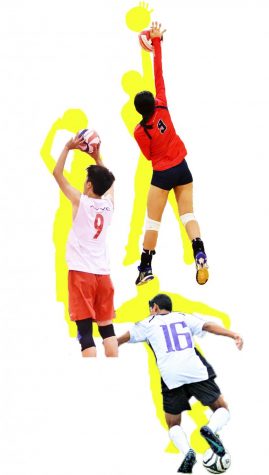Strength in numbers
MVHS athletes discuss the significance of their jersey numbers
November 20, 2018
She sprinted out the door, balancing a half-eaten bowl of oatmeal in one hand while she tried to tie back her hair. Her unzipped soccer bag swung around, revealing the mess of wrinkled clothes, shin guards and power bars inside. Clambering into the back seat her car, she set the oatmeal aside as she reached into her bag to start changing. As she tugged on her sky-blue jersey, she leaned over to pull out her shorts when it hit her. She groaned quietly, finally realizing that she had grabbed her older brother’s bag during her crazed rush out of the house.
The jersey didn’t fit, the shirt hanging loosely off her small 6-year-old frame, the shorts sagging around her skinny legs. Imagining herself running around the soccer field with a jersey many times too large, the only comfort for her was the fact that she didn’t have to sit out that day since her precious jersey number was printed on the back of her brother’s jersey as well.
Sophomore Samantha Dunn says she developed an attachment to her jersey number, nine, ever since she began playing sports, starting with soccer. Since then she has switched to volleyball, but chose to keep the number throughout her athletic career.

PHOTOS COURTESY OF SAMANTHA DUNN, EL ESTOQUE, WILLIAM LIOU
“Originally when I started my first sport, soccer, nine was the position number for the forward, and as a little kid everyone wants to be the forward who scores all the goals,” Dunn said. “I’ve just had it for so long that I feel like it’s part of me.”
Her number quickly increased in significance in her life. Now, Dunn tries to use the number nine whenever possible, picking it whenever given a choice and even using it as a part of her passwords at times. She firmly believes that her jersey number provides her with a feeling of comfort, even when not on the court playing volleyball.
Unlike Dunn, junior William Liou’s jersey changed from nine, in his first year, to 10, and he often makes switches if he deems necessary. Liou prefers the number 10 on the court, but the number he wears ultimately doesn’t matter much to him.
“As an athlete there are a lot of superstitions that come into play,” Liou said. “Some people feel like they perform better if they have their lucky number or something. Me personally, it’s number 10, it looks nice on the jersey. It’s not as obnoxious as the number one but it’s still like looks nice.”
Dunn agrees with Liou, recalling past games in which not having the right number has affected her teammates’ performance. In one case at a regional tournament, one of her teammates had forgotten the right color jersey at the hotel she was staying at and had to swap jerseys with another player. According to Dunn, wearing the wrong number agitated the player so much that the player threw numerous tantrums for consistently making mistakes throughout the day, and treated her teammates harshly when they attempted to comfort her during timeouts and when resting during breaks.
For Dunn, a change in number causes her to become superstitious. Eventually, Dunn says, she gets used to wearing something other than nine, but takes a while to adjust. She needs time to become accustomed to the new number, and may not be fully mentally present when playing during the adjustment period.
“I just feel more comfortable when I’m in my jersey with my number,” Dunn said. “It’s a superstitious thing, where I feel like if I don’t have my number then I’m not going to play the way I normally do. If I’m assigned a number, then I try to think of a way that it connects to nine. Then I eventually feel more comfortable.”
Sophomore Alvin Tian also recognizes that most athletes are more comfortable in the jersey number they have played in extensively, saying that players generally acclimate after wearing the same number for a while. This feeling of comfort, he claims, can give players improved confidence, luck or zeal for their sport.
“In baseball specifically, when people are batting, their team will call out their number in support,” Tian said. “Some people definitely carry a sense of pride from their numbers. [Not having the right number] decreases morale because a lot of the game is mental. You feel less inclination to do well and won’t try as hard, and then blame it on the fact that you don’t have your number.”
Apart from making athletes feel lucky, Liou believes that a jersey is an extension of one’s own name. In most of Liou’s volleyball matches, his opponents don’t know him by name and instead identify him through his number, constantly scouting him out as a potential threat and marking his position on the court due to his central role on the team as a setter.
“When you’re on the court, your number is like your name,” Liou said. “People aren’t defined by their actual names on the court, they’re defined by their numbers. So picking your numbers is like picking your name, it represents a bit of who you are.”



























